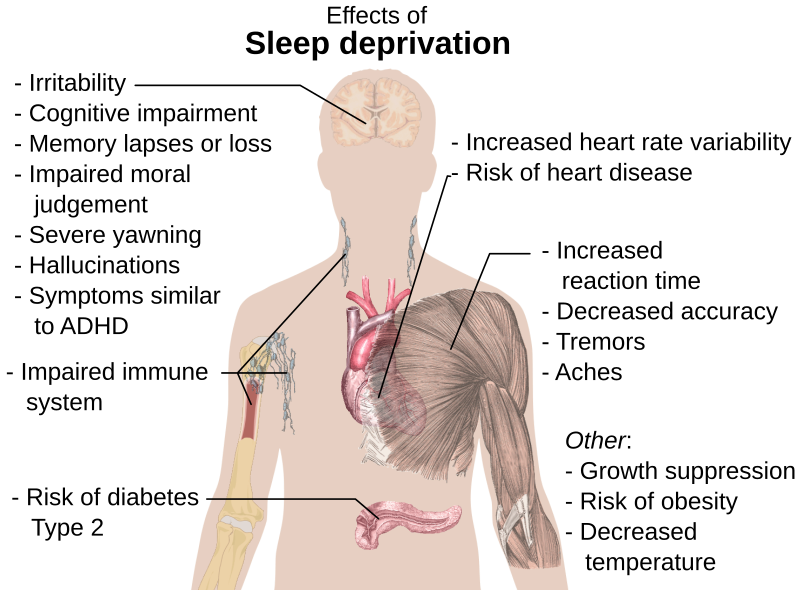Psychologists Explain How Boring Buildings Are Harmful To Our Mental Health
Slumber deprivation is pretty common these days—it's a major attribute of achievement-oriented societies—only why would anyone have a love-hate relationship with information technology? Usually, ane would say,sleep impecuniousness and all the accompanying symptomsare the definition of a love-hate relationship, to the core.
Let me tell you something: you tinutilise slumber deprivation for your own do good. We'll get into how this works, merely first, let's discuss the phenomenon of sleep, sleep impecuniousness and its symptoms, and finally design a "how to" experiment about sleep deprivation(commonly known equally cocky-torture), and ask ourselves, more importantly, why?
Sleep: Functionality
"Sleep is a naturally recurring land characterized by reduced or absent consciousness, […] and inactivity of nearly all voluntary muscles." (Macmillan, 1981). This is a short and clear explanation:
- slumber is characterized past sleep stages/cycles (five cycles, differing in depth)
- the deeper your sleep, the better the quality of sleep
- More than Sleep ≠ Meliorate (good for you avg. 7.5-9 hours)
The functions of sleep are very multifaceted and majorly unexplored, simply these (validated, and commonly accepted) aspects involvement united states of america the well-nigh right now. Sleep has a major impact:
- on our retentiveness and the power to re-organize thoughts, experiences and to learn new things (neuroplasticity)
- on the regulation of necessary hormones and the ability of our trunk to regenerate physically
What is Sleep Deprivation?
Slumber deprivation is the lack of slumber: either information technology was acquired past a very superficial and brusque slumber (over a menstruum of some days) or by no sleep at all. The functionality and benefits of slumber are limited equally a result (run across above), and we might face someserious problems, if we stay sleep-deprived for a prolonged period of time.
The effects of sleep deprivation are various; some occur instantly afterwardsacute impecuniousness, other occur merely subsequentlychronic deprivation:

(by Mikael Häggström, Wikimedia Commons, 2009)
Afterwards acute deprivation:
- irritability
- cognitive impairment
- memory lapses
- restricted judgement
- severe yawning
- increased centre-rate variability, increased reaction time and decreased accuracy
- temporary emotional instability
After chronic impecuniousness:
The effects of chronic impecuniousness boil down to the development of diverse diseases, such every bit:
- Diabetes
- center disease
- growth suppression
- restricted allowed system functionality
- weight gain/loss
- depression
Due to the diversity of acute deficits, slumber deprivation has been used equally a successful interrogation technique. In fact, the U.Due south. military authorised slumber deprivation every bit an interrogation method (Leave no Marks: Enhanced Interrogation Techniques and the Risk of Criminality, August 2007).
Merely hey, why would there exist adear-hate relationship here? What'south the do good for us?!
How To (..and the benefits of sleep deprivation?!)
The effects of sleep impecuniousness on the human being body were observed and analyzed in the 70s: the methodological monitoring involved blood analysis, but also neuropsychological instruments to capture the brain activeness during sleep-deprivation and duringrecovery sleep after deprivation.
The results:"In that location'south evidence of antidepressive effect after sleep deprivation."As a matter of fact, subjects experienced a37.2 % improvement in their mood!
The background of these results are diverse—the reasons behind the remarkable mood improvement are, amid others:
- biochemical investigations proved an increase of dissimilar hormones, including serotonin and noradrenaline, which are likewise known to functionas a happiness hormone (serotonin) and stimulating hormone (noradrenaline)
- improved sleep continuity and depth in the night after sleep deprivation
These mentioned furnishings take action in depressedmerely also not-depressed people,significant that you can stay awake for a dark, begin the next twenty-four hours as you usually practice and try to keep yourself awake (that's not very easy!) and go to bed quite early → sleep like a baby → wake upward the next forenoon withmore than power and energy.
Past depriving yourself of sleep, yousset your biological clock to zip— in case your time management is messed upwards and running out of fuel, this can very helpful (a love-hate relationship). You can telephone call sleep deprivationsleephacking: at kickoff we abstain from sleep, and later on (during the recovery night) we slip into a very deep state of sleep, which will regenerate united states.
Absolutely, sleep impecuniousness amid healthy people is often met with skepticism, mainly because salubrious subjects tin regulate their slumber design in other ways (through nutrition, sleep hygiene and sleep rituals). On the other hand, slumber deprivation is complimentary of whatsoever serious side effects and can serve as a quick fix. Here's a curt how-to:
- Perform your slumber impecuniousness "experiment" on the weekend (working in a sleep deprived country can be hard)
- Keep yourself awake during your sleep deprivation dark (and the following 24-hour interval) with the assistance of tea or coffee, but please don't overdo it
- Become to bed early on your sleep-deprived day, and enjoy your deep recovery night (7.five – 9 hours)
- Wake up powerful and energized, feeling like a meg dollars
Afterwards your sleep deprivation experiment you should take care of a well-balanced diet and good sleeping habits—exercise not regress to erstwhile, negative tendencies. Sleep deprivation for a night can be applied easily, is highly effective and free of serious side effects. Have you already tried information technology? Share your feel with us!
Featured photo credit: Lux Graves via unsplash.com
Source: https://www.lifehack.org/520763/psychologists-explain-how-boring-buildings-are-harmful-to-our-mental-health
Post a Comment for "Psychologists Explain How Boring Buildings Are Harmful To Our Mental Health"